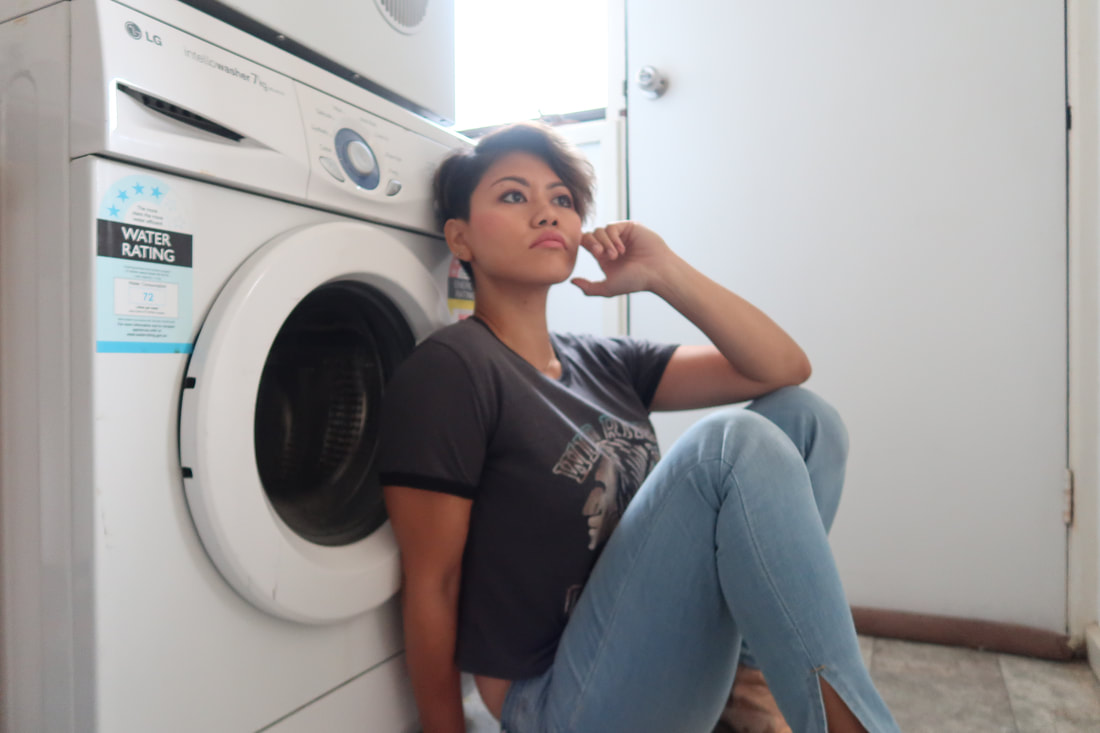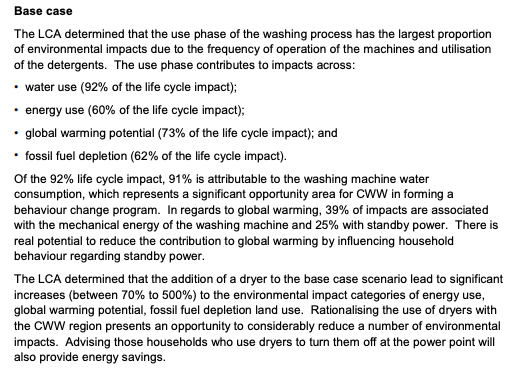|
Do you know that most people launder too much? If you call yourself a subscriber of Slow Fashion, then I’m here to remind you that the way you care for and wash your clothes is the biggest factor in sustaining this lifestyle claim. So Fashion Revolution Week is here, y’all. It started with Earth Day on Monday (22 April) and the week’s activities will continue until Sunday 28 April.2091 words; 10 min read Earth Day is an annual event celebrated to demonstrate support for environmental protection. First celebrated in 1970, Earth Day now includes events in more than 193 countries which are coordinated globally by the Earth Day Network. Fashion Revolution is concerned with “… (uniting) people and organisations to work together towards radically changing the way our clothes are sourced, produced and consumed.” If you’re reading this then you’ll know Fashion Revolution Week is a movement that took its calling at the back of one of the worst workplace tragedies in modern history – the collapse of Rana Plaza in Bangladesh in 2013 where over 1000 garment factory workers perished. The catchphrase ‘Who Made My Clothes?” has since been popularised in mainstream media to shed light of the horrible practices against humanity, perpetrated by what we now know as fast fashion. As a lot of you might know I am an advocate of Slow Fashion and have been writing about ‘going slow’ and appreciating the clothes you already have immensely. I see people who are embracing Slow Fashion movement do these (in no particular order):
There’s a crucial element in the care of your clothes, that is a big factor in making the Slow Fashion lifestyle a success, that many of us possibly are still in the habit of not doing: considering the frequency of washing our clothes. And herein lies the problem: some of us wash too frequently. ...a big factor in making the Slow Fashion lifestyle a success, that many of us possibly are still in the habit of not doing: considering the frequency of washing our clothes. I bring this up because washing too frequently is a habit that is very personal. It’s something that is hard to break because it comes from a different place, psychologically. I must say I don’t have a problem with washing too much as my grandma had taught me to be very frugal with resources from a young age, and then as I was studying environmental engineering in my 20’s, I understood early the effects of consuming resources have on our planet. I have since been mindful of packaging, chemicals, resources and the infrastructures to make them available, and waste generation. But I know some people wash too frequently – I currently live with a person (who shall be unnamed) who claim to only appreciate a minimalist wardrobe – but is obsessed with washing quite regularly. I understand we can’t all be perfect human beings, and we all have our weaknesses and psychological shortcomings. But, as I feel so passionate about behaviours that we only have control over, I’m inclined to talk about washing. My conviction about treading lightly on this earth is so strongly reflected in that good ol’ motto of ‘Think Global, Act Local’. Positive action starts with you – a.k.a. myself – and I have always been very clear about that. The science of clothes washingSo let me remind you to rethink the way we wash our clothes. In my old job at City West Water (CWW), a water retailer servicing residents and businesses in the inner western suburbs of Melbourne and the Central Business District, one of my colleagues was charged with heading a research project as part of the company’s Sustainability Covenant agreement with EPA Victoria at the time. The year was 2010. The state of Victoria was coming out of a ten-year drought – by purely implementing conservation strategies, no less! – and the company wanted to continue to understand how our residents used water in their homes. So, with the help of a consultant and experts, we embarked on a Life Cycle Analysis (LCA) study of domestic clothes washing. Life-cycle assessment (LCA, also known as life-cycle analysis, ecobalance, and cradle-to-grave analysis) is a technique to assess environmental impacts associated with all the stages of a product's life from raw material extraction through materials processing, manufacture, distribution, use, repair and maintenance, and disposal or recycling. It is regularly used in product design and in is a tool to measure a product’s impact. The aim of the LCA for domestic clothes washing was to inform potential future programs designed to assist City West Water’s residential customers to reduce their overall environmental impact when washing and drying clothes. The assessment separated the clothes washing process into three phases: upstream, use, and downstream. The upstream phase established the production and delivery of key products and materials. The use phase concentrated on the regular use of equipment by households, recognising resources consumed. The downstream phase identified the disposal and treatment of materials and wastewater. Note: this LCA study was focused on the ‘activity’ of washing, as opposed to the making of a ‘product’, its use, and disposal. The LCA considered CWW customers’ most common approach to domestic clothes washing, per kilogram (kg) of clean dry clothes, referred to as the base case. The assessment then quantified potential environmental benefits and outlined key behavioural actions customers can adopt to improve the environmental performance of clothes washing and drying. The LCA revealed that many variables affecting the life cycle impacts of clothes washing are directly influenced by customers behaviour. Throughout the everyday use of machines customers can make a significant reduction in embodied impacts by reducing detergent consumption, filling the machine to capacity, ensuring that the machine is switched off when not in use and avoiding the use of a dryer. When a new machine is purchased, customers should allow for careful consideration of the size of the machine as well as the energy and water rating. Detergent manufacturers also have a key role to play in providing detailed guidance about detergent dosing according to machine type and loading. The paper can be found here. If that sounds a bit technical for you, here’s the breakdown:
Furthermore, here are some more pertinent points made in the Report – just go straight to page 79 for this excerpt. In summary, the ‘washing’ part, i.e. pertaining to the ‘use’ of the washing machines, instead of the upstream and downstream portions of the activity, has the most impact to the environment. And this is solely attributed to individual behaviour with regards to washing. The footprint of making clothesYou can’t digest the above information without understanding that making clothes overall has an environmental impact. There are different figures going around, but the consensus is that for most items in your wardrobe, like a basic cotton T-shirt or a pair of jeans, the majority of the impact of the product rests with the wear and wash of the product. There are mainly a lot of life cycle analyses on carbon impact of clothing only that is consistent on the findings of the wear and wash, instead of the whole environmental impact. A Swedish assessment of five garments for environmental impact found laundry only contributed to 3% of the ‘base’ item’s whole lifecycle impact, so this throws a spanner in the works. Having said that, perhaps a lot of studies have focused on carbon impact purely because it takes a major chunk of the total impact areas in Life Cycle Analysis studies. That’s my take on it, anyway. Here is an example statement that supports the argument that washing and caring for clothes constitutes a big proportion of the clothing’s environmental impact: According to a study by Ademe, almost half of the environmental impact of a pair of jeans comes from the jean’s use and “end of life.” Just wash less, okay?Anyway, you get the gist. Back to too frequent washing. We know there are some things we can do to exert more influence in the way we consume our clothes. If you want to do right by the Slow Fashion movement, then please take note of your washing habits. This article published on The Conversation provides some interesting research on how washing less is a more sustainable way to go – whether or not you choose to consciously consume your fashion choices. Overall, changing how you care for your clothes can almost halve the ecological impact of your clothes. Washing jeans less often in cold water, and hanging them out to dry lessens textile waste, considering a dryer consumes five times more energy than a washing machine. Refraining from dry-cleaning a pair of jeans saves the same amount of energy that it takes to heat a home for 387 hours. Don’t forget to use the right amount of detergent and wash on a full load and voíla! – you’re well on your way to be a true Slow Fashion leader. Easy to do in a temperate climate like Melbourne though. Here are my top tips:
There are some challenges, I agree. I had lived in Kuala Lumpur the whole of 2018 and due to sweat from the humidity some of the items I want to wear in accordance to my rules (see above) just wasn’t happening. I also understand you may have kids, workwear that is exposed to the outdoors, you have an annoying allergy, you're feeding and caring for a newborn, etc. Here is a good article by 1 Million Women of the 9 ways to lower the carbon impact of laundry day, and here is the most useful thing I’ve found on the internet about tackling the smells of your gross workout gear in the wash. Don't worry, you ain't dirtyLook, at the end of the day, what dirty clothes means to you might be completely different to how I describe mine. If you’re slightly grossed out by my rules on wearing clothes, I completely understand. But I give you this: never have I ever, ever, been described as unhygienic or looking less than ‘fashionable’ when I go meet people. There’s a respectable element to wear clothes that are ‘fresh’, but let’s be honest – most of us ain’t toiling away in cottonfields or working in mines at any given day so there’s a fair chance you can be conscious about the way you wash your everyday clothes. In the name of Slow Fashion, right? Go all the way, brothers and sisters. I’m with you.
Join us in our Slow Fashion movement with the hashtags #ConscientiousFashionista and #wardrobetruths on Instagram, and follow us at @fashinfidelity. Tags: #fashrev #fashionrevolution #fashionrevolution2019 #fashionrevolutionweek #laundry #washingclothes #environmentalimpact #LCA #lifecyceanalysis #ethicalfashion #sustainablefashion #ecofashion #greenfashion #responsiblefashion #circularfashion #circularity #conscientiousfashionista #fastfashion #slowfashion #sustainability #wardrobetruths #fashioneducation #fashionisnolongertrendy #fashion #saynotofastfashion #fashionnews References:
8 Comments
|
Details
�
#FashionEducationAdding substance to the Conscious Fashion chatter. Archives
April 2024
Categories
All
Resources
Read more.. |
||||||||||||
Acknowledgement of Country
FASHINFIDELITY acknowledges First Australian peoples as the Traditional Custodians of this country (known as Australia) and their continued connection to land, sea, and culture. FASHINFIDELITY pays their respects to the resilience and strength of Ancestors and Elders past, present, and emerging and extends that respect to all First Australian peoples. FASHINFIDELITY is brought to you from the traditional lands of the Wurundjeri Woi Wurrung and Bunurong peoples of the Kulin Nation.
FASHINFIDELITY acknowledges First Australian peoples as the Traditional Custodians of this country (known as Australia) and their continued connection to land, sea, and culture. FASHINFIDELITY pays their respects to the resilience and strength of Ancestors and Elders past, present, and emerging and extends that respect to all First Australian peoples. FASHINFIDELITY is brought to you from the traditional lands of the Wurundjeri Woi Wurrung and Bunurong peoples of the Kulin Nation.





